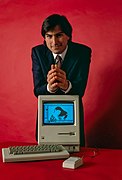
Back بوابة:إنترنت Arabic دەروازە:ئینتەرنێت CKB Portál:Internet Czech Portal:Internet German Portal:Internet Spanish درگاه:اینترنت Persian Portail:Internet French פורטל:אינטרנט HE Պորտալ:Համացանց Armenian Portal:Internet ID
The Internet PortalThe Internet (or internet) is the global system of interconnected computer networks that uses the Internet protocol suite (TCP/IP) to communicate between networks and devices. It is a network of networks that consists of private, public, academic, business, and government networks of local to global scope, linked by a broad array of electronic, wireless, and optical networking technologies. The Internet carries a vast range of information resources and services, such as the interlinked hypertext documents and applications of the World Wide Web (WWW), electronic mail, telephony, and file sharing. The origins of the Internet date back to research that enabled the time-sharing of computer resources and the development of packet switching in the 1960s. The set of rules (communication protocols) to enable internetworking on the Internet arose from research and development commissioned in the 1970s by the Defense Advanced Research Projects Agency (DARPA) of the United States Department of Defense in collaboration with universities and researchers across the United States and in the United Kingdom and France. The ARPANET initially served as a backbone for the interconnection of regional academic and military networks in the United States to enable resource sharing. The funding of the National Science Foundation Network as a new backbone in the 1980s, as well as private funding for other commercial extensions, encouraged worldwide participation in the development of new networking technologies and the merger of many networks using DARPA's Internet protocol suite. The linking of commercial networks and enterprises by the early 1990s, as well as the advent of the World Wide Web, marked the beginning of the transition to the modern Internet, and generated sustained exponential growth as generations of institutional, personal, and mobile computers were connected to the network. Although the Internet was widely used by academia in the 1980s, the subsequent commercialization in the 1990s and beyond incorporated its services and technologies into virtually every aspect of modern life. (Full article...) Selected article
Cyberpunk is a genre of science fiction that focuses on computers or information technology, usually coupled with some degree of breakdown in social order. The plot of cyberpunk writing often centers on a conflict among hackers, artificial intelligences, and mega corporations, tending to be set within a near-future dystopian Earth, rather than the "outer space" locales prevalent at the time of cyberpunk's inception. Much of the genre's "atmosphere" echoes film noir, and written works in the genre often use techniques from detective fiction. While this gritty, hard-hitting style was hailed as revolutionary during cyberpunk's early days, later observers concluded that in terms of literature, most cyberpunk narrative techniques were less innovative than those of the New Wave, twenty years earlier. Primary exponents of the cyberpunk field include William Gibson, Bruce Sterling, John Shirley and Rudy Rucker. The term became widespread in the 1980s and remains current today.
Selected picture Metropolitan area networks, or MANs, are large computer networks usually spanning a city. They typically use wireless infrastructure or Optical fiber connections to link their sites. News
Wikinews Internet portal
WikiProjects
Did you know (auto-generated) -
Selected biography
William Ford Gibson, born March 17, 1948, in Conway, South Carolina is an American-Canadian writer who has been called the "noir prophet" of the cyberpunk subgenre of science fiction. Gibson coined the term cyberspace in 1982, and popularized the concept in his debut novel, Neuromancer (1984). In depicting a visualised worldwide communications network before the ubiquity of the Internet, Gibson is credited with anticipating important aspects, and establishing the conceptual foundations, of the Internet and the Web in particular. Although much of Gibson's reputation has remained rooted in Neuromancer, his work has continued to evolve conceptually and stylistically. After expanding on Neuromancer with two more novels to complete the dystopic Sprawl trilogy, Gibson became central to an entirely new science fiction subgenre—steampunk—with the publication in 1990 of the alternate history novel The Difference Engine, written in collaboration with Bruce Sterling. In the 1990s he composed the Bridge trilogy of novels, which focused on sociological observations of near future urban environments and late stage capitalism. His most recent novels—Pattern Recognition (2003), and Spook Country (2007)—are both set in a contemporary universe and have put Gibson's work onto mainstream bestseller lists for the first time.
General images -The following are images from various internet-related articles on Wikipedia.
Selected quoteMore Did you know...
Main topics
Featured contentCategoriesRelated portalsThings you can do
Associated WikimediaThe following Wikimedia Foundation sister projects provide more on this subject:
Wikipedia's portals |
© MMXXIII Rich X Search. We shall prevail. All rights reserved. Rich X Search





















































